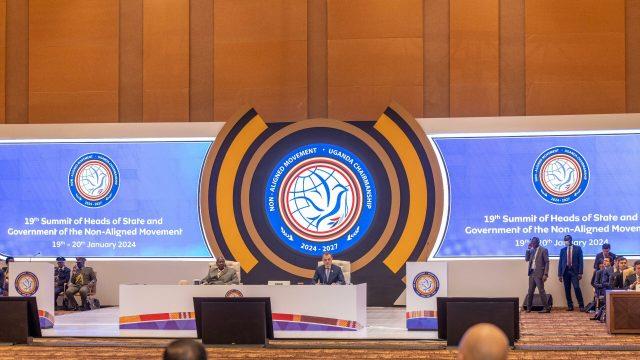The Non Aligned Movement, Neutrality and Multipolarity
The Non Aligned Movement, Neutrality and Multipolarity
By Anuradha Chenoy*

Two summits the Non-Aligned Movement (NAM) and G-77 (Group of 77 countries), both in Kampala, Uganda January 19_ 22, 2024, indicate new stirrings in the Global South. This geographical metaphor for the former colonies, earlier called the ‘under developed countries’ and then the ‘Third World’ now clubbed as the Global South, show collective political assertion that is startling the great and hegemonic powers.
The gathering of foreign ministers of the 120 countries of NAM in this 19th meeting, strongly condemned the illegal Israeli military aggression in Gaza, demanded ceasefire, unhindered, expanded humanitarian assistance and expressed support for South Africa’s genocide case against Israel at the International Court of Justice. The African Union Commission’s Chair Moussa Faki Mahamat described the war in Gaza as ‘immoral and unacceptable’, while South African President Cyril Ramaphosa called for a release of the hostages and the start of talks for a just solution for Palestine.
The Kampala Declaration has not minced words to ask for an end to Israeli occupation, including achievement of the independence and sovereignty of the State of Palestine, with East Jerusalem as its capital, and also demanded Israel withdraw as the occupying power of the Syrian Golan to the borders of 4 June 1967.
NAM’s urgent call for ending the unjust war in Palestine, was framed in three intersecting contexts that reflect the concerns of the Global South:
(i)Constructing a multipolar world with a reformed UN as its cornerstone. India’s External Affairs Minister S. Jaishankar, focussed on this, arguing that despite overcoming colonialism, the world still grapples with new forms of inequality and domination. South African President also called for reform of the United Nations since it is inadequate in preventing conflicts. The collective South clearly believes that a world with multiple great and middle powers would give more spaces for the voices for the Global South and their platforms like NAM.
(ii)Emphasis on South-South solidarities. This was the theme of this meeting and the agenda of the G-77 meeting that followed. All African countries are members of NAM and voiced support for a NAM that would work for collective, coordinated policies and solidarity. Regionalisation and decentralization of global decision making was chimed.
(iii)A drive for a more fair and equitable world order. This was framed in anti-imperialist language by the current president of NAM and host President Yoweri Museveni, who critiqued ideas and practices of imperialism and ‘uni-ideology’ and questioned “why not respect the freedom of everybody if you are a democrat?” Linked to this were the repeated demands for sustainable development and methodologies for this. It was stated that the last few years had seen more wars and conflicts that were undermining and damaging the interests on the countries of the South.
Through the meeting, there was a recalling of the basic principles of NAM: that respect the UN Charter, sovereignty and territorial integrity; equal recognition of all races; abstention from intervention and interference in internal affairs of another country; opposition to unilateral economic sanctions, with a demand that these be lifted; opposition to collective military arrangements that threatened the security of the rest of the world.
Declaratory Resistance?
So is NAM primarily a platform for high declarations, with little capacity for action? Unlike NATO for example, that carries out actions, uses military force even without declarations? This impression of non-action stands challenged currently as these examples show:
(i)South Africa a member of NAM, BRICS and the African Union took a lead to practice anti-apartheid and non-violence and take Israel to the International Court of Justice on a case of genocide against Gaza. It has been backed by many members of the Global South and now formally by the NAM Foreign Ministerial. The countries of the North have largely backed Israel with the US calling the South African case “meritless, counterproductive and completely without any basis in fact whatsoever”.
(ii) Analysis shows that from 1946 to 2019 (and to date), countries of the Global South have collectively voted in the United Nations for: a two state solution to Israel-Palestine; call for arms control; oppose unilateral economic sanctions; have collectively opposed US/NATO wars of interventions in the various countries of the Global South. While the US, EU countries have either opposed, vetoed, or voted against these resolutions.
Is neutrality inherently peaceful?
Non Alignment as policy has advocated neutrality during conflict situations. This movement however, has continuously clarified that this ‘neutrality’ is not a juridical equidistance between warring sides, but a political position, that where there is a ‘just war’ against oppression as there is in Gaza, Palestine they would take sides. Just as they opposed and did not stand neutral against wars of intervention in Vietnam, Iraq, Libya, and elsewhere.
Ultimately, it would appear, that the NAM that had started fading after the first Cold War ended and the US declared the ‘unipolar phase’ of its dominance, this movement of the Global South is once again revving up its act. The NAM does not coordinate its actions, appears anarchic, is body without a clear structure but has taken a moral if marginalised position in international politics.
*Anuradha Chenoy is an Associate Fellow of The Transnational Institute, and Adjunct Professor, Jindal Global University (Haryana, India).


